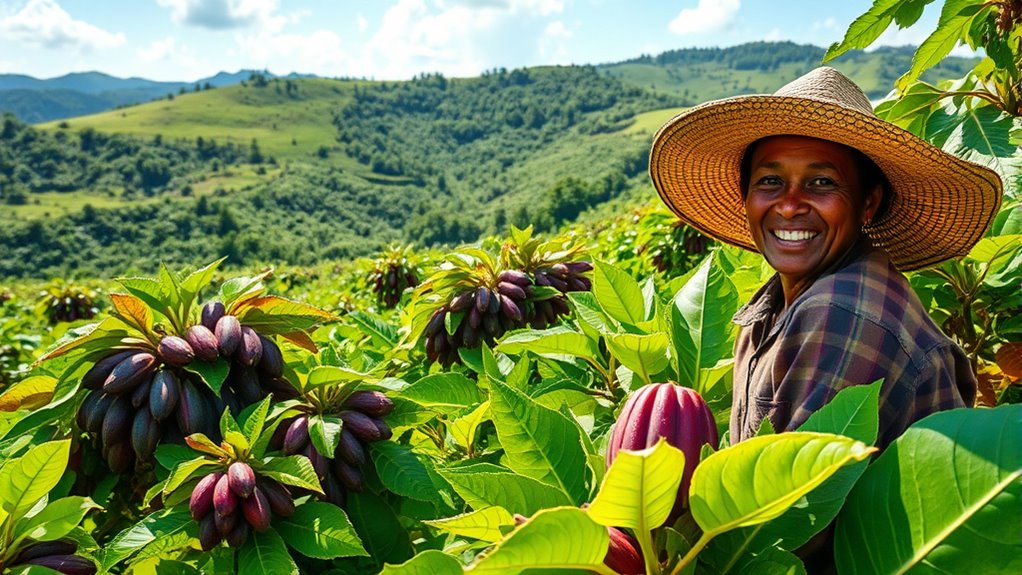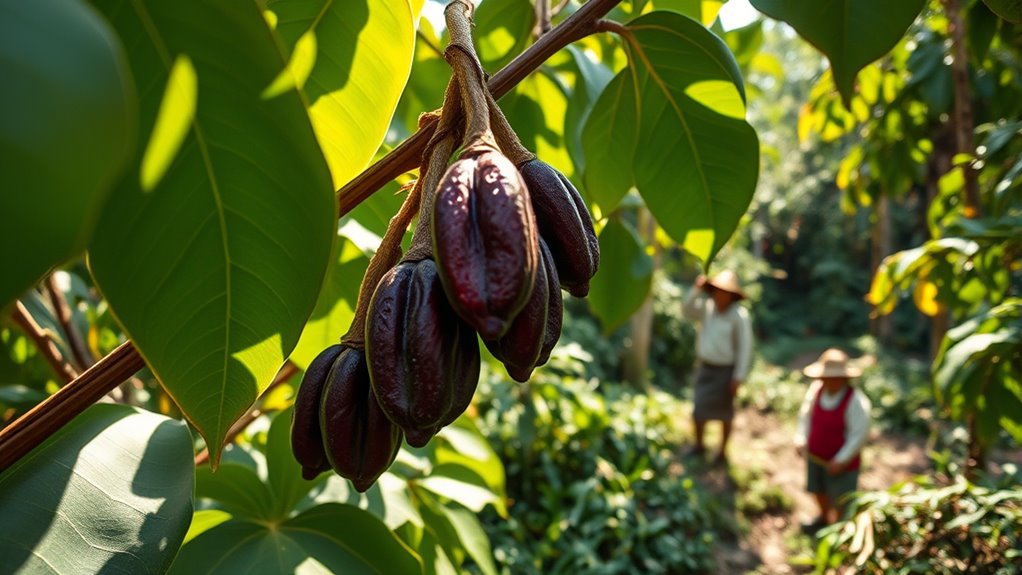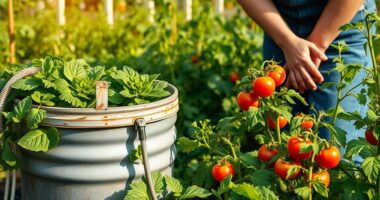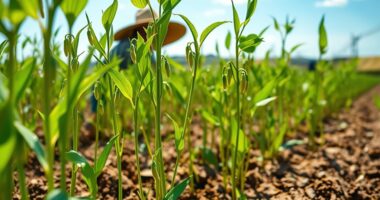By choosing fair-trade cacao, you help support sustainable farming practices that protect forests and prevent deforestation. Fair-trade standards promote eco-friendly techniques, like agroforestry and water conservation, which preserve biodiversity. Your purchase can also empower farmers with fair prices and resources, reducing the urge to clear additional land. If you keep exploring, you’ll discover how consumer choices can make a real difference in defending our planet’s forests.
Key Takeaways
- Choosing fair-trade certified chocolate supports sustainable farming that prevents deforestation and habitat loss.
- Fair-trade standards promote agroforestry, preserving biodiversity and reducing the need to clear forests for cacao cultivation.
- Consumers can influence supply chains by purchasing responsible products, encouraging eco-friendly and socially equitable practices.
- Certifications ensure farmers use water-efficient, organic, and environmentally friendly methods that protect ecosystems.
- Supporting fair-trade cacao helps empower farmers, reducing incentives to clear land for additional plantations.

Have you ever wondered how your chocolate choices can make a difference? When you pick fair-trade cacao, you’re supporting more than just delicious treats—you’re encouraging sustainable farming practices that protect the environment and improve farmers’ lives. Sustainable farming methods prioritize the health of the land, water, and local ecosystems, ensuring that cacao cultivation doesn’t contribute to deforestation or habitat loss. Instead of destructive clearing of forests for new plantations, fair-trade initiatives often promote agroforestry, where cacao trees grow alongside native plants, preserving biodiversity and reducing environmental impact. By choosing fair-trade, you’re directly supporting farmers who commit to these eco-friendly practices, helping to maintain forest cover and curb the destruction caused by large-scale, unsustainable farming. Additionally, adopting self-watering plant pots can help farmers practice water-efficient cultivation, further supporting sustainable agriculture.
Understanding how to identify genuine fair-trade cacao starts with looking at certification processes. These processes are designed to verify that farmers and companies adhere to strict standards that promote ethical and sustainable practices. When a product is certified, it means it has met rigorous criteria related to environmental sustainability, fair wages, and safe working conditions. Certifications like Fair Trade International or Rainforest Alliance are recognized globally and serve as reliable indicators that your chocolate was produced with responsibility and care. These certification processes involve regular inspections and audits, ensuring that companies uphold the standards that support sustainable farming and prevent practices that lead to deforestation. By purchasing products with credible certifications, you’re making an informed choice that encourages the entire supply chain to prioritize environmental stewardship and social equity.
Supporting fair-trade cacao also helps create a positive economic impact on farming communities. Farmers who participate in fair-trade programs often gain better access to resources, training, and fair prices, which empowers them to invest in sustainable practices and community development. This economic stability reduces the temptation to clear more land for additional cacao planting, consequently limiting deforestation. Additionally, fair-trade standards often include requirements for environmentally friendly waste management, water conservation, and the use of organic fertilizers. These practices further minimize ecological damage and promote long-term land health.
Your chocolate habit holds power—by choosing fair-trade, certified cacao, you’re actively promoting sustainable farming that protects forests and supports farmers’ well-being. It’s a simple but impactful way to contribute to the fight against deforestation, ensuring that future generations can enjoy chocolate without sacrificing our planet’s precious ecosystems. So next time you reach for a chocolate bar, check the label. Your conscious choice can help preserve rainforests, promote fair treatment, and foster a more sustainable world for everyone.
Frequently Asked Questions
How Does Fair-Trade Certification Impact Local Cacao Farmers?
Fair-trade certification positively impacts local cacao farmers by promoting farmer empowerment and improving market access. You support farmers who receive fair prices, helping them invest in sustainable practices and community development. This certification guarantees they can access broader markets, increasing their income stability. As a result, farmers can focus on environmentally friendly farming, which reduces deforestation, benefiting both their livelihoods and the planet. Your chocolate choices can make a meaningful difference.
Are All Chocolates Labeled as Fair-Trade Environmentally Sustainable?
Like a thin veil, some chocolates claiming fair-trade are just greenwashing myths, not fully sustainable. Not all are environmentally friendly because certification limitations exist, and labels can be misleading. You need to check for genuine fair-trade marks and sustainable practices, rather than assuming all labeled chocolates support eco-friendly farming. Your choices matter—by being informed, you can genuinely help fight deforestation and support ethical production.
What Are the Challenges in Enforcing Fair-Trade Standards Globally?
You might wonder about enforcing fair-trade standards globally. Challenges include ensuring supply chain transparency, so you know where your cacao comes from, and raising consumer awareness about fair-trade benefits. Without strict oversight, some producers might cut corners, making it harder to guarantee ethical practices. Your support can help push for better enforcement, but widespread change requires coordinated efforts among governments, certifiers, and consumers like you.
Can Fair-Trade Cacao Help Restore Deforested Areas?
Imagine a world where your chocolate habit can actually help restore forests. Fair-trade cacao plays a pivotal role in this mission, promoting carbon sequestration and biodiversity conservation. By supporting fair-trade practices, you empower farmers to adopt sustainable methods that reforest degraded areas. This not only captures carbon but also revives ecosystems, turning your favorite treat into a tool for environmental renewal. Your choices can make a real difference in healing our planet.
How Does Fair-Trade Cacao Affect Cacao Yield and Quality?
Fair-trade cacao positively impacts yield and quality by promoting better soil health and pest management. When you choose fair-trade, farmers often use sustainable practices that improve soil nutrients, leading to healthier cacao plants. Additionally, integrated pest management reduces crop damage without harmful chemicals, boosting yield and ensuring high-quality beans. Your support encourages farmers to maintain these eco-friendly methods, resulting in more consistent, better-tasting chocolate while protecting the environment.
Conclusion
By choosing fair-trade cacao, you hold the power to make a difference. Every bite of your chocolate could be helping to stop deforestation, protect communities, and preserve our planet’s future. But the question remains—will you continue to buy without thinking, or will you take a stand now? The choice is yours. The more you learn, the clearer it becomes—your next chocolate bar might just change everything. Are you ready to make that change?










